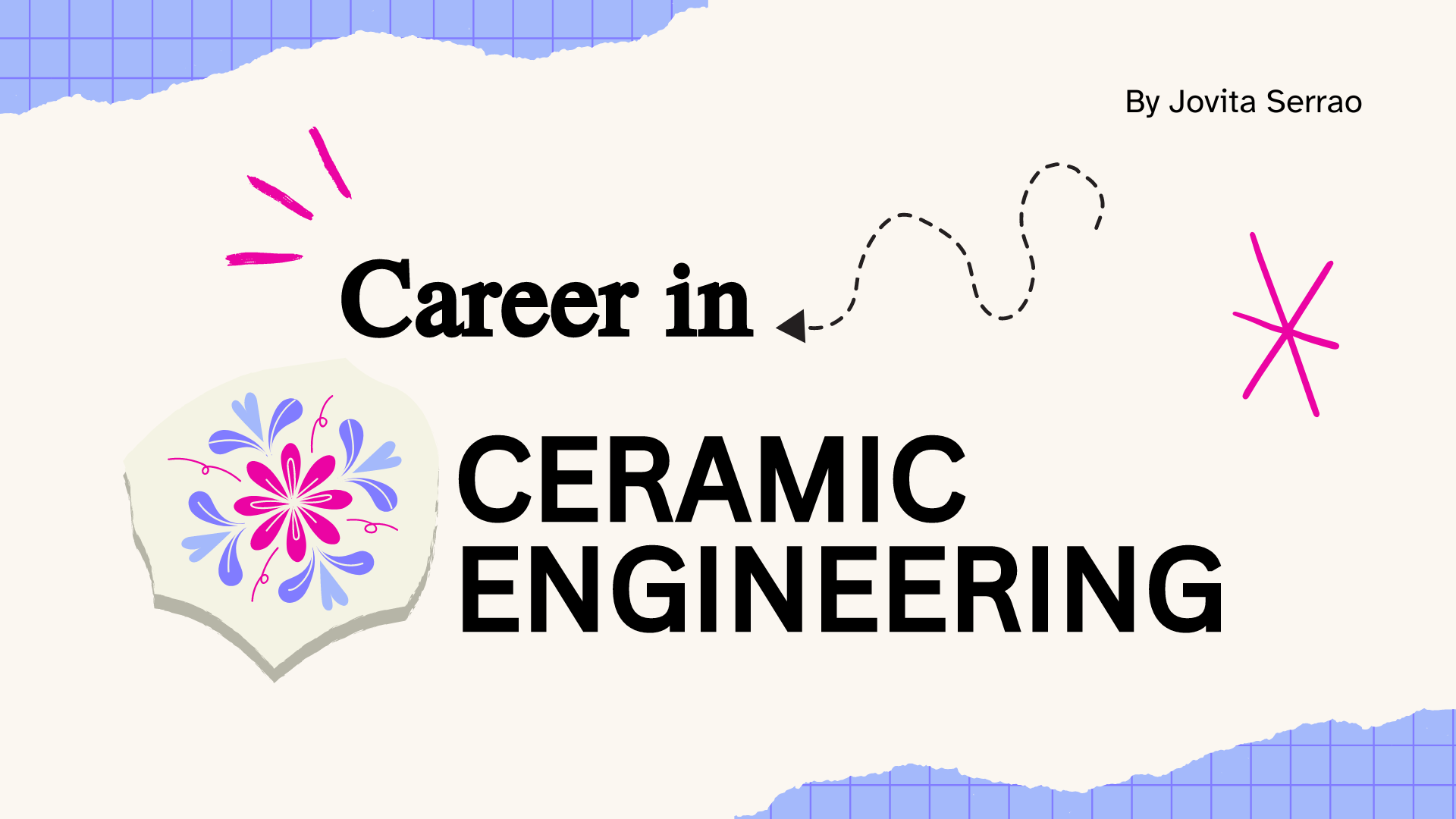
Crafting the Future: A Comprehensive Guide to a Career in Ceramic Engineering
Have you ever marveled at the intricate designs of pottery or the innovative applications of ceramic materials in technology? Are you curious about how ceramics are used in everything from electronics to aerospace? Why should you consider a career in Ceramic Engineering? What specializations are available, and what does a typical day look like for a ceramic engineer? This blog provides a detailed guide for students in India on pursuing a career in Ceramic Engineering.
Why Choose a Career in Ceramic Engineering?
A career in Ceramic Engineering offers the opportunity to work with one of the most versatile materials in the world. Ceramics are integral to various industries, including electronics, construction, healthcare, and aerospace. Ceramic engineers are involved in designing and developing materials that are used in everyday objects as well as cutting-edge technologies. This field is ideal for those interested in material science and technology with a passion for innovation.
Specializations in the Career
Ceramic Engineering encompasses various specializations, including:
- Advanced Ceramics
- Ceramic Materials for Electronics
- Bioceramics
- Structural Ceramics
- Ceramic Coatings
Day-to-Day Activities of a Ceramic Engineer
The daily activities of a ceramic engineer can vary based on their specialization and role but generally include:
- Designing and developing new ceramic materials and products
- Conducting experiments and tests to analyze material properties and performance
- Collaborating with other engineers and scientists to solve technical problems
- Overseeing the manufacturing process and quality control of ceramic products
- Researching advancements in ceramic materials and technologies
- Ensuring compliance with safety and environmental regulations
Eligibility Criteria
To pursue a career in Ceramic Engineering, candidates in India typically need:
Pathways After SSC (10th Grade):
- Enroll in a Diploma in Ceramic Engineering, which can be followed by lateral entry into the second year of a Bachelor’s degree program.
Pathways After HSC (12th Grade):
- Complete 12th grade with a focus on Physics, Chemistry, and Mathematics (PCM).
- Qualify for entrance exams such as JEE Main, state-level engineering entrance exams, or specific exams for ceramic engineering programs.
Higher Education:
- A Bachelor’s degree in Ceramic Engineering (B.E./B.Tech).
- Advanced positions may require a Master’s degree (M.E./M.Tech) or PhD.
Job Opportunities
Ceramic engineers have diverse job opportunities in various sectors, including:
- Ceramic product manufacturers
- Electronics and semiconductor industries
- Aerospace and defense industries
- Healthcare and medical device companies
- Construction and building materials companies
- Research and development organizations
Salary
Salaries for ceramic engineers in India can vary based on experience, location, and specialization. On average:
- Entry-level engineers can expect to earn between INR 3 to 6 lakhs per annum.
- Mid-level professionals may earn between INR 6 to 12 lakhs per annum.
- Senior-level engineers and managers can earn INR 12 lakhs and above per annum.
Key Skills Required
To excel in Ceramic Engineering, one must possess:
- Strong analytical and problem-solving skills
- Proficiency in materials science and engineering principles
- Excellent communication and teamwork abilities
- Project management skills
- Attention to detail and quality control
- Knowledge of ceramic processing, materials characterization, and testing methods
Industry Trend/Future Prospects
The future of Ceramic Engineering is promising, driven by trends such as:
- Development of advanced ceramics for electronic and optical applications
- Innovations in bioceramics for medical implants and prosthetics
- Growth in the use of ceramics in aerospace and defense technologies
- Advances in ceramic coatings and materials for energy efficiency
- Increasing focus on sustainable and eco-friendly ceramic materials
Top Institutes in India:
- IIT Bombay - Indian Institute of Technology
- NIT Rourkela - National Institute of Technology
- Indian Institute of Technology, BHU, Varanasi
- Visvesvaraya Technological University
- PES College of Engineering
Fees
The cost of a Ceramic Engineering program in India can vary widely:
- Diploma programs: INR 20,000 to 50,000 per year
- Bachelor’s programs: INR 1 to 2 lakhs per year in government colleges; INR 3 to 6 lakhs per year in private colleges
- Master’s programs: INR 1 to 3 lakhs per year
Scholarships/Loans
Many institutions offer scholarships and loans, such as:
- National Scholarships (e.g., MHRD scholarships)
- State Government Scholarships
- Institution-specific scholarships
- Education loans from banks and financial institutions
In Summary
A career in Ceramic Engineering offers the chance to work with a material that is crucial to numerous industries, driving innovations that impact various aspects of our daily lives. By developing the necessary skills and staying updated with industry trends, you can unlock numerous opportunities and contribute significantly to advancements in ceramics. For personalized advice and guidance, feel free to reach out!
Author: Ms. Jovita Serrao
Position: Founder and Career Counselor, Career Pravaas
Contact Information: jovita.s@jetech.co.in
Stay tuned for more insights and guidance on various career paths. If you have any questions or need personalized advice, feel free to reach out!
Keywords: Ceramic Engineering, career in Ceramic Engineering, Ceramic Engineering specializations, day-to-day activities of Ceramic Engineers, Ceramic Engineering eligibility criteria, job opportunities in Ceramic Engineering, Ceramic Engineering salary in India, career progression in Ceramic Engineering, key skills for Ceramic Engineering, industry trends in Ceramic Engineering, top institutes for Ceramic Engineering in India, top institutes for Ceramic Engineering in Maharashtra, Ceramic Engineering fees, Ceramic Engineering scholarships and loans, experts in Ceramic Engineering
